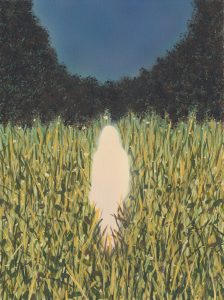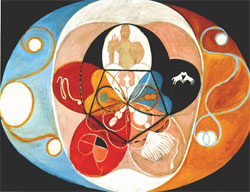 The Columbia City Yoga on-line Moving into Meditation class met this morning. We continued the practice of building beloved community. We brought mindful inquiry to the human habit of stereotyping. We often make assumptions about others. We don’t often know what difficulties a person might be carrying. The practice of awareness and intention, presence and persistence, can help us to think and feel beyond our assumptions to recognize a person’s humanity. Love inspired short moments many times can move us toward beloved community.
The Columbia City Yoga on-line Moving into Meditation class met this morning. We continued the practice of building beloved community. We brought mindful inquiry to the human habit of stereotyping. We often make assumptions about others. We don’t often know what difficulties a person might be carrying. The practice of awareness and intention, presence and persistence, can help us to think and feel beyond our assumptions to recognize a person’s humanity. Love inspired short moments many times can move us toward beloved community.
We drew inspiration from Iranian American playwright Sanaz Toossi. Her play, English, won this year’s Pulitzer Prize for Drama. It portrays the difficulties faced by immigrants. It explores how we construct and adapt identity considering complexities including: sex, ethnicity, nationality, age, socioeconomic status and language. As a first generation English speaker it reminded me of my immigrant mother and grandmother. I feel so much empathy for the struggles to communicate and to be recognized.
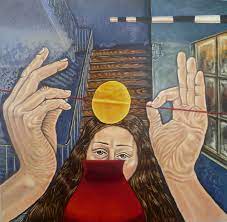 We heard Micky Scottbey Jones’ inspirational poem: Invitation to Brave Space: The poem is an invitation to “call each other to more truth and love.”
We heard Micky Scottbey Jones’ inspirational poem: Invitation to Brave Space: The poem is an invitation to “call each other to more truth and love.”
Our mindfulness inquiry was based on Anu Gupta’s inspiring Breaking Bias work. He explains that stereotype replacement involves “a conscious act of replacing our mind’s habit to stereotype another human being with positive real life counter examples.” We borrowed his teaching to help reveal implicit bias and then practice imagining another person’s full humanity.
Welcome. Last week we explored how mindfulness can help us to build beloved community. We practiced mindfulness of the implicit bias we learn through conditioning and also how mindfulness can help us to de-condition bias with awareness, compassion and presence. This week I reflected on how bias manifests in our families and our culture. I heard the moving story of an Iranian immigrant who left her country after the revolution. Her experience was depicted in, English, a play written by Iranian American Sanaz Toossi. The main character, Marjan, speaks about her experience living in an English speaking country:
When you speak another language not your own, I feel so loud all the time. My head hurts, the days feel longer. You go years without making anyone laugh. No one has any idea that you were at the top of your class or that you’re adventurous or optimistic. That you’re kind, really kind. You start to forget that you’re adventurous and optimistic and kind. How long can you live in isolation from yourself?
Her words stopped me in my tracks. Marjan could have been my mother or my grandmother. As immigrants, they were painfully self conscious of their accent, limited education and vocabulary. It was difficult for them to participate in community or to be seen outside our family circle. So much of daily life was a struggle. They had to navigate their identities as Flemish speaking women with their newly forming identities as English speaking Californians. Like so many immigrants they longed for a more expressive, visible life.
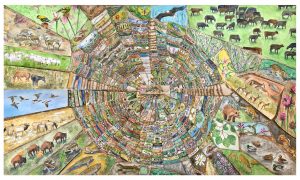 We live in an area where there are many people from other countries or different cultures. You might take a moment to reflect on people in your community that may be different from you – in appearance, language, ethnicity, culture. . . . I think it is easy to not see the difficult dimensions of immigrant experience. It is easy not to see people that we don’t know. And, paradoxically, we often make assumptions about their appearance and the way they speak. Even among friends – you don’t often know what a person might be carrying. We all long for connection. We long to be seen and heard. To belong.
We live in an area where there are many people from other countries or different cultures. You might take a moment to reflect on people in your community that may be different from you – in appearance, language, ethnicity, culture. . . . I think it is easy to not see the difficult dimensions of immigrant experience. It is easy not to see people that we don’t know. And, paradoxically, we often make assumptions about their appearance and the way they speak. Even among friends – you don’t often know what a person might be carrying. We all long for connection. We long to be seen and heard. To belong.
We know that the practice of mindfulness can help to create life affirming habits of self-care and engaging the world. The practice of awareness and intention, presence and persistence, actually retrain our brains. Love inspired short moments many times can move us toward beloved community. I want to share Micky Scottbey Jones’ inspirational poem: Invitation to Brave Space:
Listen
Together we will create brave space.
Because there is no such thing as a “safe space” —
We exist in the real world.
We all carry scars and we have all caused wounds.
In this space
 We seek to turn down the volume of the outside world,
We seek to turn down the volume of the outside world,
We amplify voices that fight to be heard elsewhere,
We call each other to more truth and love.
We have the right to start somewhere and continue to grow.
We have the responsibility to examine what we think we know.
We will not be perfect.
This space will not be perfect.
It will not always be what we wish it to be.
But
It will be our brave space together,
and
We will work on it side by side.
Let’s practice a way to cultivate more truth and love together. This practice is inspired by Anu Gupta’s program of Breaking Bias. In this practice we aspire to retrain our mind’s habits of putting people into limited stereotype boxes. We can learn to recondition our minds by replacing those boxes with positive ways of seeing people. This can be an opportunity to learn about our amazing fellow humans and to share this brave space of beloved community.
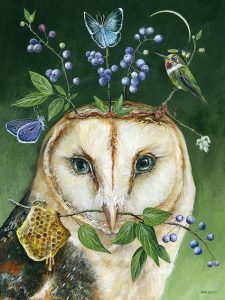 I invite you to adjust your position if you need to. You might stretch a moment or two. Take a few deep breaths and let them out slowly. Bring your awareness to your body and notice what you feel. Give yourself this time to feel – perhaps starting with the muscles of your face, neck and throat. Relax any tension you can. Shoulders, arms and hands. Chest and belly. Relax and feel breathing in these areas. The length of your spine, pelvis and sit bones. Hips, legs and feet. Notice the quality of energy in your body. As you continue to feel breathing notice what’s happening in your mind. Thinking, remembering, planning, anticipating. See if you can release any expectations or attachments for things to be other than just as they are. Present and feeling breath and body. Open to any sense of holding in the body, the mind. Whatever surfaces can be in this mindful space of your awareness.
I invite you to adjust your position if you need to. You might stretch a moment or two. Take a few deep breaths and let them out slowly. Bring your awareness to your body and notice what you feel. Give yourself this time to feel – perhaps starting with the muscles of your face, neck and throat. Relax any tension you can. Shoulders, arms and hands. Chest and belly. Relax and feel breathing in these areas. The length of your spine, pelvis and sit bones. Hips, legs and feet. Notice the quality of energy in your body. As you continue to feel breathing notice what’s happening in your mind. Thinking, remembering, planning, anticipating. See if you can release any expectations or attachments for things to be other than just as they are. Present and feeling breath and body. Open to any sense of holding in the body, the mind. Whatever surfaces can be in this mindful space of your awareness.
Now we’ll call on imagination, memory and inquiry. I’ll say a few words and invite you to notice the first association that arises in your mind after hearing the words. If a person surfaces notice what that person looks like- their age, gender, ethnicity height, nationality. See if you can free yourself from any self judgment or any need to change what’s happening in the mind. “. . . I will begin. Powerful. Powerful. . . . Notice who arose for you. Did you think of someone who looks like Malala Yousafzai? Pakistani, Moslem, girl born under the Taliban who accessed her power for gender equality and girls education. She’s a true testament of what it means to be powerful. . . . See if you can imagine a picture of Malala. Powerful, Malala Yousafzai, Pakistani, Muslim woman, powerful. Malala Yousafzai, powerful. That’s possible in our humanity too.”
Now take a moment to come back to your breath as you release that association. See if you can return to a sense of ease in your body. You might notice thinking. If it’s compelling you can continue being aware of breathing and the nature of the compelling thoughts. You can be present with these compelling thoughts as they change and gradually fade.
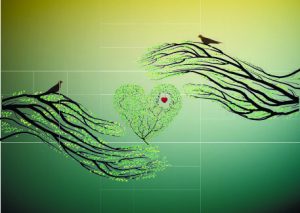 We’ll continue with another inquiry. Recall someone who you may have stereotyped in some way. Someone you may have consciously or unconsciously associated with certain qualities based on characteristics including sex, gender identity, race, ethnicity, nationality, age, socioeconomic status or language. Give yourself a bit of time to recall a time you may have made certain assumptions about someone. See if you can see them again in your mind. What were those assumptions? What was your inner experience like as you encountered this person? What was your response to this encounter? See if you can imagine other positive associations about this person. Imagine what positive qualities or associations that might be part of this person’s humanity? Perhaps they are someone’s loving son or daughter, parent or grandparent. They might be a student or teacher. An artist or writer. A health carer or hospice companion. How does it feel to imagine this person’s full humanity?
We’ll continue with another inquiry. Recall someone who you may have stereotyped in some way. Someone you may have consciously or unconsciously associated with certain qualities based on characteristics including sex, gender identity, race, ethnicity, nationality, age, socioeconomic status or language. Give yourself a bit of time to recall a time you may have made certain assumptions about someone. See if you can see them again in your mind. What were those assumptions? What was your inner experience like as you encountered this person? What was your response to this encounter? See if you can imagine other positive associations about this person. Imagine what positive qualities or associations that might be part of this person’s humanity? Perhaps they are someone’s loving son or daughter, parent or grandparent. They might be a student or teacher. An artist or writer. A health carer or hospice companion. How does it feel to imagine this person’s full humanity?
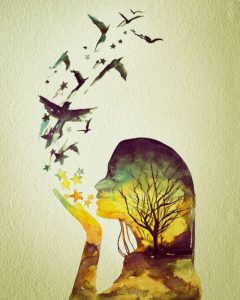 Now take a moment to come back to your breath as you release that association. We’ll continue with another example. “I’ll say another word now notice who arises in your mind after you hear this word. Caring. Caring. Notice who arose for you. Did you think of someone who looks like you? You are a person who cares or wants to care about what you see in your surroundings. [A person who cares about] the divisions and hurt that plague our society because of bias. That seed of deep caring is there. That seed of deep caring is within you. . . . This is . . an invitation. See if you can imagine a picture of yourself when you hear the word caring.” See yourself as a caring person. Take a moment to come back to your breath and feel your body here, in the room where you are in this moment.
Now take a moment to come back to your breath as you release that association. We’ll continue with another example. “I’ll say another word now notice who arises in your mind after you hear this word. Caring. Caring. Notice who arose for you. Did you think of someone who looks like you? You are a person who cares or wants to care about what you see in your surroundings. [A person who cares about] the divisions and hurt that plague our society because of bias. That seed of deep caring is there. That seed of deep caring is within you. . . . This is . . an invitation. See if you can imagine a picture of yourself when you hear the word caring.” See yourself as a caring person. Take a moment to come back to your breath and feel your body here, in the room where you are in this moment.
I invite you to take a few moments to really feel the effects of this practice in your body, your mind your heart. How does it feel to bring your caring forward in this way without judgment or shame? In mindfulness we sense and feel the body calling our attention again and again. In mindful presence we can acknowledge the people before us in a caring, curious way.

